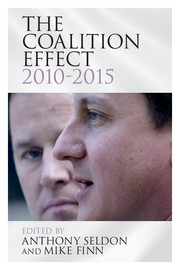Book contents
- Frontmatter
- Contents
- Contributors
- Acknowledgements
- David Cameron as Prime Minister, 2010–2015: The verdict of history
- Part I The coalition and the government of Britain
- Part II The coalition and policy
- 6 The coalition and the economy
- 7 The coalition and energy policy
- 8 The coalition and infrastructure
- 9 The coalition and society (I): Home affairs and local government
- 10 The coalition and society (II): Education
- 11 The coalition and society (III): Health and long-term care
- 12 The coalition and society (IV): Welfare
- 13 The coalition and foreign affairs
- 14 Europe: The coalition's poisoned chalice
- 15 ‘What the coalition did for women’: A new gender consensus, coalition division and gendered austerity
- 16 The coalition and culture: ‘Bread, circuses and Britishness’
- Part III The coalition and political culture
- Part IV Conclusion
- Index
12 - The coalition and society (IV): Welfare
Published online by Cambridge University Press: 05 April 2015
- Frontmatter
- Contents
- Contributors
- Acknowledgements
- David Cameron as Prime Minister, 2010–2015: The verdict of history
- Part I The coalition and the government of Britain
- Part II The coalition and policy
- 6 The coalition and the economy
- 7 The coalition and energy policy
- 8 The coalition and infrastructure
- 9 The coalition and society (I): Home affairs and local government
- 10 The coalition and society (II): Education
- 11 The coalition and society (III): Health and long-term care
- 12 The coalition and society (IV): Welfare
- 13 The coalition and foreign affairs
- 14 Europe: The coalition's poisoned chalice
- 15 ‘What the coalition did for women’: A new gender consensus, coalition division and gendered austerity
- 16 The coalition and culture: ‘Bread, circuses and Britishness’
- Part III The coalition and political culture
- Part IV Conclusion
- Index
Summary
Introduction
For most of the history of Britain's welfare state from 1948, benefit payments rode under the banner of social security. Over the past couple of decades, however, social security has more or less fallen out of the political lexicon. It has been replaced by the Americanism ‘welfare’. In the United States, however, welfare has a narrow meaning. It applies chiefly to means-tested out-of-work support for lone mothers. It has nothing to do, for example, with the decidedly generous and popular US federal pension system.
In the UK, ‘welfare’ is occasionally used with a degree of precision to cover means-tested help for the workless – although even here its meaning has been more or less turned on its head to become a term of abuse, implying cash hand-outs to a far from always deserving poor, in a rhetoric that divides society into ‘strivers vs scroungers’.
More often these days, ‘welfare’ is used indiscriminately to cover the whole of a social security budget which in 2010 totalled some £190 billion. It had – and still has – many different purposes. Getting on for half of it was spent on pensions, the bulk of which depend on people having paid sufficient national insurance contributions to qualify. Other significant elements included child benefit, a universal payment to recognize the additional costs of children; tax credits to support people in lower-paid work, who are anything but the feckless poor; and money to recognize the extra costs of disability. Roughly half the spending went to people of working age. But only about one-fifth of the £190 billion was being spent on people of working age who were out of work for whatever reason – the unemployed, lone parents, the sick and the disabled and those who cared for them.
The use of the term ‘welfare’, with its implication of means-testing for everything and chiefly for those out of work, has muddied the debate about the purposes and the effects of this largest single element of public expenditure – some 30 per cent of the total – and the public's understanding of it.
- Type
- Chapter
- Information
- The Coalition Effect, 2010–2015 , pp. 317 - 344Publisher: Cambridge University PressPrint publication year: 2015
- 5
- Cited by



